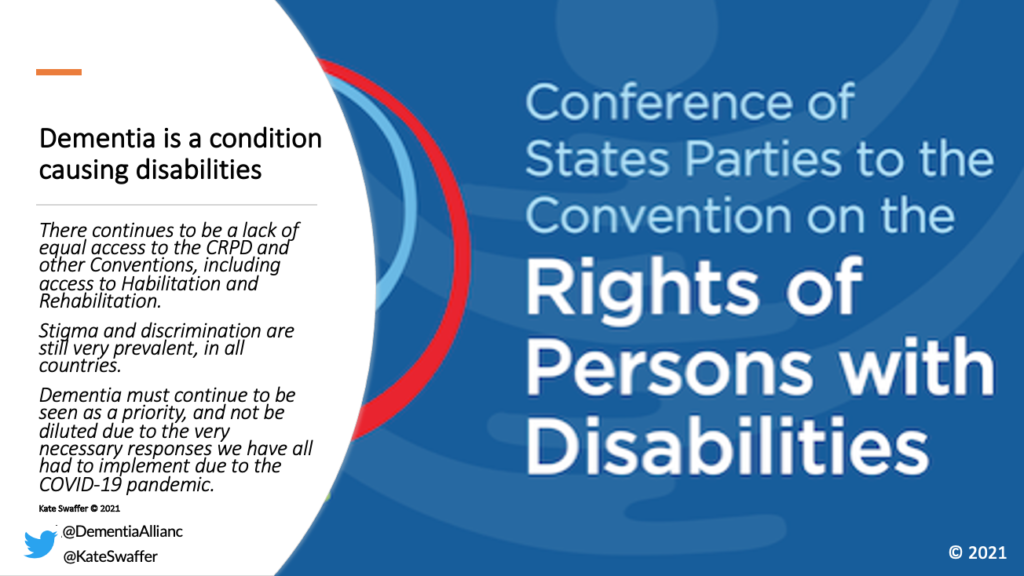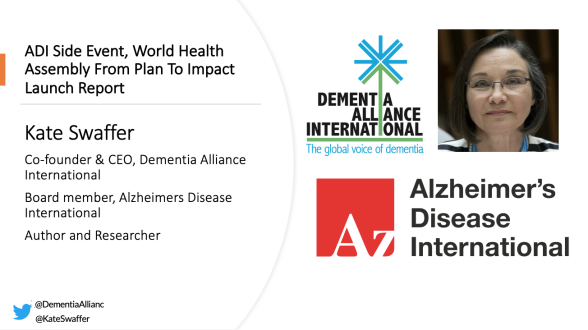
DAI's CEO & co-founder Kate Swaffer was recently invited to be a panellist at the ADI Side Event for the launch of their 4th 'From Plan To Impact Report'.
We introduce this blog-post with a reminder there continues to be a lack of equal access to the CRPD and other Conventions for all people with dementia.
Below is the transcript of Kate's brief presentation and summary of the Side Event.
Kate Swaffer, World Health Assembly 2021
ADI Side Event, 26 May 2021
Thanks so much Paola and thank you once again for the invitation to join this panel at this important World Health Assembly Side Event which you are hosting. As always, I feel humbled to represent the more than 50 million people living with dementia globally.
It’s been really inspiring to hear from our colleagues around the world, and the progress that is being made, and also to have examples of such great leadership from Indonesia and the Asia Pacific, and in Kenya and Africa. I guess as always, my role is to be a bit of a Devil’s Advocate, and I wanted to highlight a number of issues that people with dementia particularly feel need to be considered in National Dementia Plans.
There continues to be lack of recognition in policy, and in post diagnostic support and services for dementia that it is a major cause of disability.
There continues to be a lack of access to disability assessment and support, referrals to rehabilitation after diagnosis, although it is great to know that the WHO are currently developing guidelines on rehabilitation for dementia.
There needs to be a focus on Rights in national plans, and a focus on stigma and discrimination because all of the time I have been involved in this space I have not seen any change in the prevalence of stigma and discrimination, anywhere in the world [nor does research or the multiple reports about these issues].
What is frustrating for me personally and for people with dementia that I talk to, is that ADI were talking about a rights-based focus for dementia as far back as their report in 2012 that I have read, and I made three calls to action at the WHO First Ministerial Conference on Dementia in 2015, which were about:
- That we have human right to a more ethical pathway of care, that
- we have access to the same human rights and disability rights as everyone else, under the Disability Discrimination Acts and UN Convention on the Rights of Persons with Disabilities, and
- that research does not only focus on a cure, but on our care, including rehabilitation.
So, in summary we don’t seem to have come too far with progress for people with dementia. We have made progress but as Paola and others, and Tarun have said, we are well behind the 2025 target, and less than 100 countries have national dementia plans
- We have made progress, but we are well behind the 2025 target
- > 100 countries still do not have National Dementia Plans [in fact, only 40 contries have National Dementia Plans]
- We do need a Rights based focus is needed in all national dementia plans and policies [comment in chat box of someone also advocating for that]
- We need strategies to support well-being and quality of life for people with dementia and our families
- It is important we need to strengthen health systems; only today I was talking to someone in Adelaide Australia where I live whose mother suddenly needs a significant amount of in-home care, and there is none available for the next 12 months. I live in a rich country, and this is not really good enough!
- There is a growing concern on the impact of dementia on women and girls
- There are still very poor diagnosis rates and poor post-diagnostic care
- I totally agree the focus on risk reduction as with all other chronic diseases is imperative, and needs to be included in national dementia plans
- Dementia must continue to be seen as a priority and we must not let it be diluted due to the very necessary responses due to covid.
- Still poor diagnosis rates and lack of post diagnostic care
- Risk reduction, in line with other diseases, is increasingly important
Dementia must continue to be seen as a priority, and not be diluted due to the very necessary responses we have all had to implement due to the COVID-19 pandemic
I do have hope, but also feel as Gill Livingston has said, the time to act is now.
Thank you.
Footnote: Governments, Alzheimer’s organisations, health care professionals and service providers all around the world need to use the UN Convention on the Rights of Persons with Disabilities to benefit people living with dementia, which was also highlighted in the 2012 WHO-ADI Report, Dementia: a public health priority.
